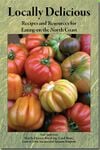
By Carol Moné
Eating Local? What does it mean? How extreme can one get with the idea of being a locavore? These questions are addressed in other sections. For now, let’s look at some factors which prevent us from being true locavores.
Amazingly, people have a hard time eating locally. One difficulty is addiction. The big imports—coffee, tea, chocolate and sugar—are not foods so much as drugs. Regular consumption of these items was, until very recently, only for the wealthy. Some say addictions can be broken, but I will remain happily addicted to caffeine so long as my morning coffee is fair trade and organically grown.
A second hurdle is desire. Spices are nice to have, but our overall nutrition doesn’t depend upon them, and obviously one would never consider sourcing cinnamon locally. Spices are “extras.” Native plants exist with the medicinal properties inherent in many imported herbs and spices, making this a good topic for further exploration. But in spite of recent research illustrating medicinal properties for cinnamon and cardamom, exotic spices are, nonetheless, true taste luxuries. Look for organic non-irradiated spices. Certain spices may be “fair trade” products.
A third problem is expectation. An imported orange in December was a big treat a mere generation ago; now it is the norm. Grocery stores have trained us to expect and want everything year round, which has bred confusion about both seasons and food origins and ultimately has led us to simply not care: it’s there, I buy it. Eating becomes an exercise in unawareness. A plethora of cookbooks requiring exotic and manufactured ingredients does not lessen this expectation. As one moves toward local eating, one’s awareness of seasonal eating effortlessly increases, and expectations magically change.
Economics is a fourth enormous obstacle. The hidden costs of eating subsidized commercial foods and food products—both an expectation and a habit now—are only recently being explored and addressed. But because of these subsidies and hidden costs, healthful food is often more expensive at the checkout counter. Avoid the checkout counter in favor of the farmers’ market. There is no such thing as expensive zucchini in August. Eating seasonally and canning or drying the excess will ameliorate this problem. Knowing your producers—farmers, cattlewomen, goatherds, shepherds, gatherers and fishers—is far more powerful than knowing from which country your food originated. China is quite large. Look more toward knowing the reputation of your food producers and suppliers than relying upon federal organic certification in local products. Often farmers go far beyond federal requirements for organic. Observe their practices firsthand. Organic is good, “more-ganic” is even better.
